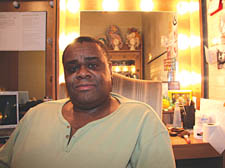|
|
 |
| |
Is traditional panto just a stage joke?
Oh no it isn’t!
Be it ‘Maccers’ or Widow Twanky, Clive Rowe says it’s all the same to him.
By Simon Wroe
CLIVE Rowe is not the woman he once was. Defrocked and out of his heels in his dressing room between matinee and evening shows at the Hackney Empire, the actor seems much smaller than his Mother Goose counterpart.
Rowe, a classically trained performer and one of the great panto dames working on the English stage today, looks exhausted. A dozen high-octane turns a week in “the Hamlet of panto”, as he calls it, have taken their toll.
Although Rowe, 44, has a face that always seems to be smiling, the comparison is by no means a belittlement of his trade. Mother Goose has the biggest dame role of all the classic pantos, where the dame is the star rather than a scene-stealer, and Rowe regards panto and other theatre as one and the same thing.
“I approach everything with the exact same intent and focus,” he says. “It’s all acting. Nothing is more serious or more difficult. It’s all about technique and skill. It’s like those TV quiz shows – the questions are easy if you know the answer.
“Some people pick up Shakespeare, some pick up Chekhov, some pick up cabarets or pantomimes.”
Few people besides Rowe, however, pick up both Widow Twanky and Shakespeare with equal ease. How many can claim to have worked with Sam Mendes, Nicholas Hytner and Lars von Trier and in the same breath talk of their roles as a New York bus or the back end of a horse? How many are happy to go from a Laurence Olivier Award (for Nicely Nicely Johnson in 1997’s Guys and Dolls) to playing a tumble-dryer?
Rowe’s modesty, his complete lack of ego, is a rarity in showbusiness. He speaks in a soft Northern burr a hundred decibels below the stentorian roar he commands on stage. He can’t watch himself on TV or film and he refuses to take any credit for the immense popularity of the Hackney Empire annual pantomime, in which his dames (Sarah the Cook, Widow Twanky, Jack’s Mum and an Ugly Sister, to name a few) have chewed up the scenery for the past seven years.
“Success,” he says, “is only given its boundary by the people that watch it.”
It’s evident from a quick glance around his dressing room what the audience think. Opposite his wall of extravagant wigs are dozens of gifts from admirers: Cinderella’s slipper, a pair of squeezy breasts, and numerous stuffed toys. These are the closest things Rowe has to good luck charms or theatrical superstition; there is no Macbeth of pantos, he says. (Superstitious or not, he still calls it “Maccers”.)
Rowe believes the secrets to good panto are “tradition, truth in playing, and making sure the five-year-olds understand it”.
“Everybody on stage, even when they’re messing around, has to return to the truth or the five-year-olds lose it,” he says. “We’ve got to make them feel sorry for the goose when it gets rejected. Panto has got to be for the family, hasn’t it? The five-year-olds are who we’re doing it for.”
Born in Shaw, Greater Manchester, Rowe was the youngest of seven (three brothers and three sisters). He says he would rather not talk about his parents.
“I was always performing so I must have been an extrovert,” he says. “It all stayed out of the house.”
He went to the Guildhall School of Music and Drama in 1984 but only met Susie McKenna, the writer and director of the Hackney panto, years later – he has “absolutely no recollection” of exactly when.
He played Widow Twanky in a Nottingham show; she played the son of Twanky. They have been a collaborative force ever since.
“When Susie writes it she hears me doing it, and when I read it I hear what she wants me to do,” says Rowe. “There’s no journey in between.
“As a dame I get free rein, I get to let the fetters off. Generally in theatre you’re given quite strict rules as to what you can and can’t do, but as the dame you’re allowed to change the boundaries all the time. As long as I’m not swearing or being offensive I can literally do whatever I want. I’m allowed to break the rules.”
Occasionally someone asks him why he’s in a dress. It’s a question that Rowe – a born performer – doesn’t understand.
“If putting on a frock denied my masculinity I’d be messed up in the first place,” he says. “I’m a bloke in a frock who’s having a good time. It’s nothing deeper than that.
“I just love being on stage. I couldn’t do another job where I didn’t get a pat on the back at the end of the day. With film you get ‘Cut! Do you want to do that again?’ I need the validation of theatre. I’d like to be remembered for making people laugh.”
• |

|
 |
|
 |
|

